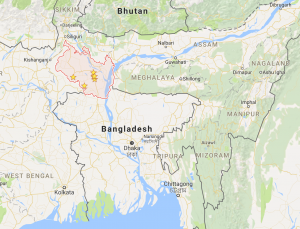 Rangpur District in northern Bangladesh is home to some 25M people. Half are illiterate and ⅓ live below the poverty line. Most survive on subsistence agriculture using the same techniques they have used for centuries. Development and the technology and resources of the modern world have largely passed them by. Rangpur district is very fertile and if anything suffers from too much rather than too little water. Heavy rain frequently disrupts the local infrastructure and flooding claims many lives each year. Local people are well endowed with natural resources, but what they lack is the know-how to make full use of them.
Rangpur District in northern Bangladesh is home to some 25M people. Half are illiterate and ⅓ live below the poverty line. Most survive on subsistence agriculture using the same techniques they have used for centuries. Development and the technology and resources of the modern world have largely passed them by. Rangpur district is very fertile and if anything suffers from too much rather than too little water. Heavy rain frequently disrupts the local infrastructure and flooding claims many lives each year. Local people are well endowed with natural resources, but what they lack is the know-how to make full use of them.
An ambitious development plan
Our partner, VSO has embarked on an ambitious project to change this. Working with a number of development  partners, they have established centres of excellence in 6 rural regions around Rangpur. In these “Farmer Centres” investment from Bank Asia offers far better rates than voracious money lenders, while trained consultants develop business skills ensuring investments are well spent.
partners, they have established centres of excellence in 6 rural regions around Rangpur. In these “Farmer Centres” investment from Bank Asia offers far better rates than voracious money lenders, while trained consultants develop business skills ensuring investments are well spent.
The objective is to help the people of Rangpur better use the resources available. This will make them more resilient to the setbacks that all too often lead to poverty.
But there is a problem.
3 months after they have finished their training, the consultants have not managed to secure a single client. Why?
Leadership development goes hand-in-hand
Well this is what a group of aspiring leaders from Rolls-Royce are starting to find out. As participants in the Grow Inspires programme, they are working to improve the entrepreneurial skills of the consultants. For an hour each fortnight, they work closely with their clients over Skype to overcome personal challenges and inspire a growth mindset. More than mentoring, this is a structured programme to properly diagnose the issues and put in place tailored development plans to ensure results.
During our group call last Friday , we were discussing what was really stopping our consultants from consulting. Was it the bank process or was it that their prospective clients simply don’t care about business plans. Perhaps they need to close the yawning gap between management jargon and something more tangible. So how do we find out? Well we get our consultants to talk to prospective clients and ask them, ideally closing a small consulting job independent of the bank. If the clients don’t bite then asking them what would make their offer more attractive will provide some really useful insights. So in truth, just now we can only speculate.
This is a huge lesson in itself.
It is tempting to jump at the obvious problem and try to solve it without really understanding it’s cause. No matter how well executed such solutions, they won’t change much. It is human nature to find external reasons why we don’t perform. We have to strip them away to expose the fertile ground in which to plant seeds of learning. You rarely achieve that in the classroom. Nobody wants to admit to weaknesses in front of peers.
And that is the point.
For both groups the next phase of their learning journey is only just beginning. Sustainable development comes from enlightened self-interest, not just altruism. To inspire people you need to understand them and the only way to achieve that is to work with them up-close and personal. Recent CMI research suggests that too many managers are scared of people, leading to a huge erosion of trust in the workplace. Not ours though. They have already discovered that you cannot judge a book by its cover. The next stage is to unlock the secrets of helping people to step just enough outside their comfort zone to break new ground without it being too scary to try. That is the most fertile soil for development and you can see how they get on here.
You don’t need to be an expert in Bangladeshi farming or markets to make a difference, but you do need an inquisitive mind, a willingness to step outside your own comfort zone and the generosity to serve others.
The payback can blow your mind.

[…] In this second article following our Rolls-Royce aspiring leaders developing skills in Bangladesh we major on motivation. In case you missed it, the first article is here. […]
[…] Sowing the seeds of development in fertile ground […]